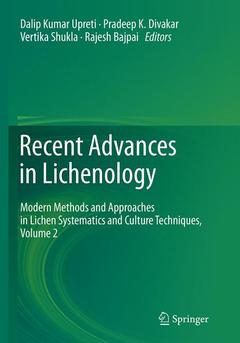Description
Recent Advances in Lichenology, Softcover reprint of the original 1st ed. 2015
Modern Methods and Approaches in Lichen Systematics and Culture Techniques, Volume 2
Coordinators: Upreti Dalip Kumar, Divakar Pradeep K., Shukla Vertika, Bajpai Rajesh
Language: English
Subjects for Recent Advances in Lichenology:
Publication date: 10-2016
Support: Print on demand
Publication date: 03-2015
232 p. · 17.8x25.4 cm · Hardback
Description
/li>Contents
/li>Biography
/li>Comment
/li>
This book discusses in detail molecular, mycobiont culture, biomonitoring and bioprospection of lichens, providing insights into advances in different fields of lichenology by applying modern techniques and approaches and examining how their application has enhanced or changed classical approaches. It offers a valuable resource, especially for beginners, students and researchers from different academic backgrounds interested in the study of lichens.
In recent years, the introduction of modern analytical techniques and approaches has significantly improved our understanding of the environment, including lichens. Lichens are unique organisms which possess untapped potential as effective and reliable bioindicators, sources of therapeutic phytochemicals, and as excellent extremophiles. The unique and peculiar characteristics of lichens underline the need for a multidimensional approach to explore their potential in various fields of environment science, botany and chemistry.
Modern techniques, especially molecular techniques, have greatly enriched the field of lichen taxonomy and its position in the plant kingdom, revealing little-known species and exploring their evolutionary history, while multivariate analysis and GIS approaches have established lichens as an ideal and reliable tool for monitoring air pollution. Advanced culture techniques have expanded the pharmacological applications of lichens, which was formerly restricted due to their small biomass. The advent of sophisticated analytical instrumentation has now facilitated the isolation and characterization of lichens? bioactive constituents, even in lower concentrations, as well as the estimation of their stress responses at different levels of pollution. As lichen diversity is adversely affected by increasing air pollution, there is a pressing need to develop effective management practices to conserve, restore and document lichen diversity.
1. Lichenization: the origins of a fungal life-style.- 2. The dynamic discipline of species delimitation: Progress towards effectively recognizing species boundaries in natural populations.- 3. Molecular phylogenetic and phylogenomic approaches in studies of lichen systematics and evolution.- 4. High-throughput sequencing in studies of lichen population biology.- 5. Type-I NR-PKS gene characterization of the cultured lichen mycobiont Xanthoparmelia substrigosa (Ascomycota).- 6. Endolichenic fungi in Kumaun Himalaya: a case study.- 7. The diversity of lichenised fungi: ecosystem functions and ecosystem services.- 8. In-Vitro Culture of Lichen Partners: Need and Implications.- 9. Biochemical Diversity and Ecology of Lichen-forming Fungi. Lichen Substances, chemosyndromic variation and origin of Polyketide-type metabolites (biosynthetic pathways).- 10. Lichen substances and their biological activities.- 11. Anti-cancer activity of lichen metabolites and their mechanisms at the molecular level.- 12. Lichen dyes: Current scenario and future prospects.
D. K. Upreti, FNASc, Head of the Lichenology Laboratory, CSIR-National Botanical Research Institute (CSIR-NBRI), Lucknow, has a Ph.D. (1983) in Botany on Studies on the lichen family Cladoniaceae from India and Nepal from Lucknow University under the guidance of Dr. D.D. Awasthi. Dr. Upreti has over 35 years of research experience and has published more than 300 research papers in peer-reviewed journals and coauthored eight books.
Apart from taxonomy, Dr. Upreti has also carried out extensive research on
ecology, lichen chemistry, pollution monitoring, in vitro culture and biodeterioration studies and bioprospection of Indian lichens. Dr. Upreti was in Antarctica in 1991–1992. He is the Indian corresponding member to the British Lichen Society and International Association for Lichenology.
P. K. Divakar has an M.Sc. in Botany and earned his Ph.D. (2002) on Revisionary studies on the lichen genus Parmelia sensu lato in India from Lucknow University. Dr. Divakar is Professor at the Department of Plant Sciences, Faculty of Pharmacy, Complutense University Madrid, Spain. Dr. Divakar has published two books and more than 70 papers in national and international journals. Currently he is editor of Biodiversity and Conservation, Mycokeys, Organisms Diversity and Evolution, and Lazaroa (Iberian Journal of Botany).
His research activities center on molecular systematics, genetic diversity, evolution, speciation events, gene mapping, gene flow, TCS estimation of gene genealogies and phenotypic character mapping, ancestral character state, and genomics of fungi that form mutualistic symbioses with algae or cyanobacteria and mycobiont cultures.
Vertika Shukla holds an M.Sc. in Organic Chemistry and a Ph.D. (2003) on the Chemical Study of Macrolichens of Garhwal Himalayas from H.N.B. Garhwal University, Srinagar (Garhwal). She is currently working in theLichenology Labora




